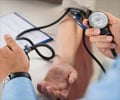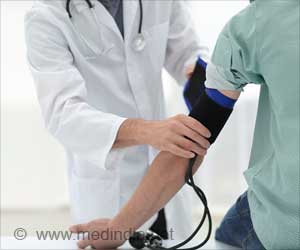Drinking alcohol on a daily basis can increase blood pressure levels, even in adults without hypertension.

Alcohol Intake and Blood Pressure Levels: A Dose-Response Meta-Analysis of Nonexperimental Cohort Studies
Go to source). //
‘Even just one alcohol a day may lead to a spike in blood pressure among adults without hypertension. #Hypertension #DrinkingAlcohol #AlcoholAddiction #BloodPressure’
Read More..




Read More..
Advertisement
Does Drinking Alcohol Raise Blood Pressure?
With the statistical power of seven international research studies, this analysis confirms for the first time there was a continuous increase in blood pressure measures in both participants with low and high alcohol intake. Even low levels of alcohol consumption were associated with detectable increases in blood pressure levels that may lead to a higher risk of cardiovascular events. “We found no beneficial effects in adults who drank a low level of alcohol compared to those who did not drink alcohol,” said senior study author Marco Vinceti, M.D., Ph.D., a professor of epidemiology and public health in the Medical School of the University of Modena and Reggio Emilia University in Italy and an adjunct professor in the department of epidemiology at Boston University’s School of Public Health. “We were somewhat surprised to see that consuming an already-low level of alcohol was also linked to higher blood pressure changes over time compared to no consumption – although far less than the blood pressure increase seen in heavy drinkers.”“Our analysis was based on grams of alcohol consumed and not just on the number of drinks to avoid the bias that might arise from the different amount of alcohol contained in ‘standard drinks’ across countries and/or types of beverages,” said study co-author Tommaso Filippini, M.D., Ph.D., an associate professor of epidemiology and public health in the Medical School of the University of Modena and Reggio Emilia in Italy, and affiliate researcher at the University of California Berkeley School of Public Health.
Researchers reviewed the health data for all participants across the seven studies for more than five years. They compared adults who drank alcohol regularly with non-drinkers and found:
- Systolic (top number) blood pressure rose 1.25 millimeters of mercury (mm Hg) in people who consumed an average of 12 grams of alcohol per day, rising to 4.9 mm Hg in people consuming an average of 48 grams of alcohol per day. (In the U.S., 12 ounces of regular beer, 5 ounces of wine or a 1.5 ounce shot of distilled spirits contains about 14 grams of alcohol. Usual alcohol content differs in alcohol available in other countries.)
- Diastolic (bottom number) blood pressure rose 1.14 mm Hg in people consuming an average of 12 grams of alcohol per day, rising to 3.1 mm Hg in people consuming an average of 48 grams of alcohol per day. These associations were seen in males but not in females. Diastolic blood pressure measures the force against artery walls between heartbeats and is not as strong a predictor of heart disease risk in comparison to systolic.
Advertisement
For Health Sake: Stop Drinking Alcohol
“Alcohol is certainly not the sole driver of increases in blood pressure; however, our findings confirm it contributes in a meaningful way. Limiting alcohol intake is advised, and avoiding it is even better,” Vinceti said.Although none of the participants had high blood pressure when they enrolled in the studies, their blood pressure measurements at the beginning did have an impact on the alcohol findings.
”We found participants with higher starting blood pressure readings, had a stronger link between alcohol intake and blood pressure changes over time. This suggests that people with a trend towards increased (although still not “high”) blood pressure may benefit the most from low to no alcohol consumption,” said study co-author Paul K. Whelton, M.D., M.Sc., the Show Chwan Chair in Global Public Health in the department of epidemiology at Tulane University’s School of Public Health and Tropical Medicine in New Orleans and president of the World Hypertension League. Whelton is also the chair of the American Heart Association’s 2017 Hypertension Practice Guidelines (2✔ ✔Trusted Source
2017 ACC/AHA/AAPA/ABC/ACPM/AGS/APhA/ASH/ASPC/NMA/PCNA Guideline for the Prevention, Detection, Evaluation, and Management of High Blood Pressure in Adults: A Report of the American College of Cardiology/American Heart Association Task Force on Clinical Practice Guidelines
Go to source) and a member of the writing committee for the Association’s 2021 Scientific Statement on Management of Stage 1 Hypertension in Adults (3✔ ✔Trusted Source
Management of Stage 1 Hypertension in Adults With a Low 10-Year Risk for Cardiovascular Disease: Filling a Guidance Gap: A Scientific Statement From the American Heart Association
Go to source).
Advertisement
Is Alcohol Good for Health?
According to American Heart Association recommendations, if you don’t drink already, don’t start. If you do drink, talk with your doctor about the benefits and risks of consuming alcohol in moderation. The Association also does not recommend drinking any form of alcohol to gain potential health benefits. Instead, follow the Association’s lifestyle and health metrics for optimal cardiovascular health called Life’s Essential 8 (4✔ ✔Trusted SourceLife's Essential 8
Go to source): eat healthy food, be physically active, don’t smoke, get enough sleep, maintain a healthy weight, and control cholesterol, blood sugar and blood pressure levels.
Study details and background:
- Researchers analyzed data from seven, large, observational studies involving 19,548 adults (65% men), ranging in age from 20 to their early 70s at the start of the studies.
- The studies were conducted in the United States, Korea and Japan, and published between 1997 and 2021. None of the participants had previously been diagnosed with high blood pressure or other cardiovascular diseases, diabetes, liver disease, alcoholism or binge drinking.
- Usual alcoholic beverage intake was recorded at the beginning of each study and the researchers translated this information into a usual number of grams of alcohol consumed daily. The researchers used a new statistical technique that allowed them to combine results from several studies and plot a curve showing the impact of any amount of alcohol typically consumed on changes in blood pressure over time.
- Systolic blood pressure, the top number in a blood pressure reading, measures the force against the artery walls when the heart contracts. It rises steadily with age and is a strong predictor of cardiovascular disease risk.
References:
- Alcohol Intake and Blood Pressure Levels: A Dose-Response Meta-Analysis of Nonexperimental Cohort Studies - (https://www.ahajournals.org/doi/10.1161/HYPERTENSIONAHA.123.21224)
- 2017 ACC/AHA/AAPA/ABC/ACPM/AGS/APhA/ASH/ASPC/NMA/PCNA Guideline for the Prevention, Detection, Evaluation, and Management of High Blood Pressure in Adults: A Report of the American College of Cardiology/American Heart Association Task Force on Clinical Practice Guidelines - (https://www.ahajournals.org/doi/10.1161/HYP.0000000000000065)
- Management of Stage 1 Hypertension in Adults With a Low 10-Year Risk for Cardiovascular Disease: Filling a Guidance Gap: A Scientific Statement From the American Heart Association - (https://www.ahajournals.org/doi/10.1161/HYP.0000000000000195)
- Life's Essential 8- ( https://www.heart.org/en/healthy-living/healthy-lifestyle/lifes-essential-8)















